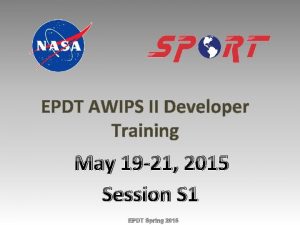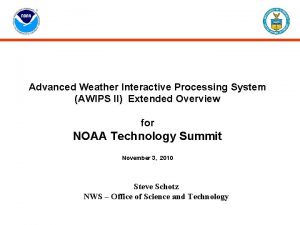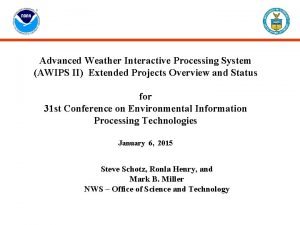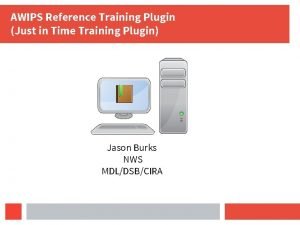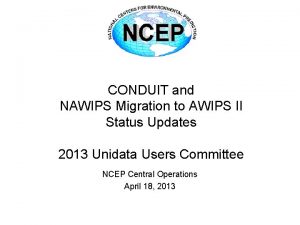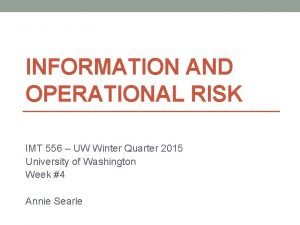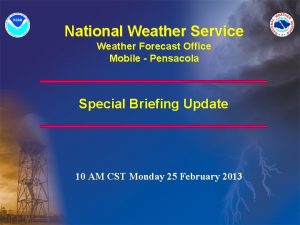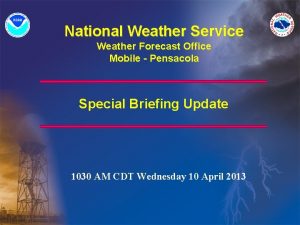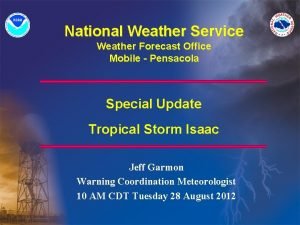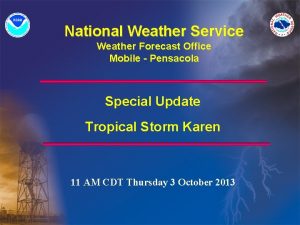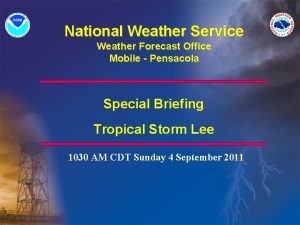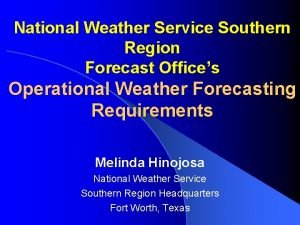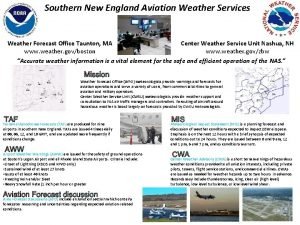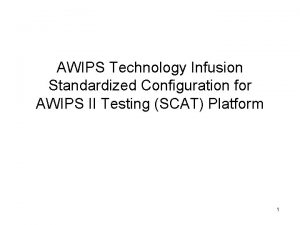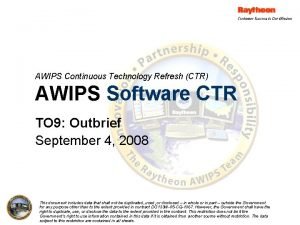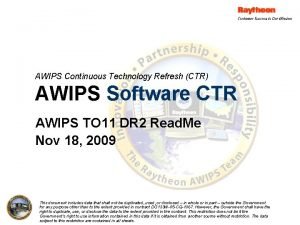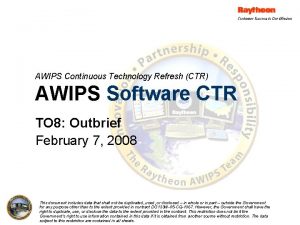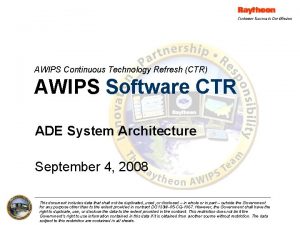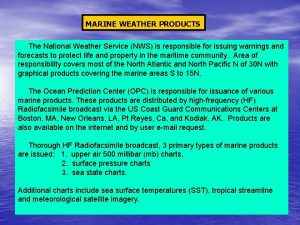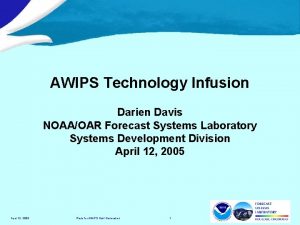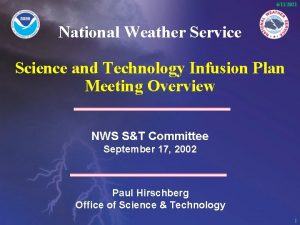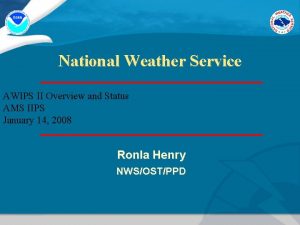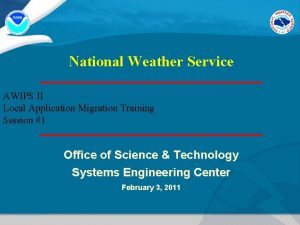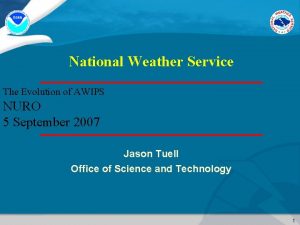National Weather Service AWIPS Technology Infusion NWS Partners













- Slides: 13

National Weather Service AWIPS Technology Infusion NWS Partner’s Meeting 17 June 2008 Ronla Henry Office of Science and Technology 1

Overview • What is AWIPS Technology Infusion? • Outcomes and Objectives • Roadmap • What does AWIPS II mean to the Partners? • Summary 2

What is AWIPS Technology Infusion? • AWIPS Technology Infusion • A long-term project which delivers a modern, robust software infrastructure that provides the foundation for future system level enhancements • AWIPS II • Implements a modern Services Oriented Architecture (SOA) infrastructure • First output of AWIPS Technology Infusion and provides the foundation for all subsequent improvements • AWIPS Technology Infusion System Improvements • Integration of “orphan” systems (e. g. , Weather Event Simulator) • Migration of N-AWIPS into the SOA to create a seamless weather enterprise that supports all levels of NWS operations from National Centers to WSOs • Data Delivery Enhancements – “Smart push-smart pull” data access – Katrina satellite WAN back up • Integrated visual collaboration – Graphical collaboration at all levels of the weather enterprise extending to trusted external partners • Visualization Enhancements • Information Generation Enhancements – Re-architecture of the generation of all NWS products and services 3

AWIPS Technology Infusion Service Improvements • More responsive to partner needs • Direct and integrated visual collaboration with Emergency Managers • Streamlined generation of products in industry standard formats • CAP, GIS, etc. • Expanded access to data for NWS and external partners • SBN enhancements, smart push-smart pull • Improved and integrated incident support for Emergency Managers and DHS • Better weather support for the FAA at CWSUs through enterprise level integration 4

AWIPS Technology Infusion Internal Improvements • Free operations from technology constraints • Seamless, flexible and extensible weather enterprise that integrates all levels of NWS operations • Integrated service delivery via the migration of AWIPS and NAWIPS into a common Service Oriented Architecture • Improved continuity of operations • • • Streamlined service back up Faster software installations More stable operations – fewer bugs • Put new science into operations faster – more accurate warnings and forecasts • Enable collaborative development between local, national and outside developers • Open source – closed community – open up development to local apps developers and those outside traditional development community, e. g. NASA, academia 5

AWIPS Technology Infusion Objectives • Establish Service Oriented Architecture for AWIPS and NAWIPS • Create a seamless weather enterprise that supports all levels of NWS operations from National Centers to WSOs • Build a common development environment that will be used by all developers • Establish infrastructure for GIS integration • Enable access to data independent of its location, i. e. , provide access to data not resident locally at the WFO or RFC. • Provide infrastructure for real time graphical collaboration between • WFOs, RFCs and centers for enhanced internal collaboration • Other NOAA entities and • Trusted partners, e. g. , Emergency Managers • Implement a Common AWIPS visualization environment (CAVE) used by all applications • Standardize generation of NWS products and services 6

AWIPS Technology Infusion Roadmap 2007 2008 2009 2010 Baseline Application Migration AWIPS II 2011 2012 2013 2014 AWIPS II OTE / Deployment Governance Model NAWIPS Migration SOA Enhancements Thin Client WES Integration AWIPS II Enhancements IOC Data Delivery Phase 1 Collaboration = Calendar Year = Fiscal Year FOC Phase 2 Phase 3 Information Generation Visualization IOC FOC IO C 7

AWIPS II Re-Architecture Approach • Perform “black-box” conversion • Preserve existing functionality, look and feel on top of new infrastructure • Thorough field validation and acceptance before deployment • No loss of functionality • Deployed system current with deployed AWIPS capability (i. e. , OB 9) • Use open source projects - No proprietary code • JAVA and open source projects enable AWIPS II to be platform and OS independent – No plans to move from Linux • Objective is to make AWIPS II available for collaborative development • OS, Platform independence allows non-Linux based research to be easily integrated into AWIPS II 8

AWIPS II Roadmap 2006 2007 AE OSIP Gates Migration Strategy 2008 3 2 4 a 2010 2009 4 b Meshed Topology MPLS OBx 7 8. 3 8 9 OB 9 Dev & Test ADE Training Development ADE Training PIP SW CTR (AWIPS II) Deployment Analysis RTS IRAD ADE Development 10 New Release Paradigm NWS New Capability Development in ADE O & M Transition Prep & Coordination O & M Transition Migration Planning Baseline Application Migration Note: Task bar colors are For speaker reference only ADE Local App Training “User” Functional Tests Local App Migration = Calendar Year Deployment Planning = Fiscal Year 06/22/07 AWIPS II 1. 0 OTE / Deployment Support C& A OTE Deployment Field Ops Training -- ITO, ESA 9

AWIPS II What does it mean to the Partners? • Transition (Mid 2009 - mid 2010) • Limited changes during transition • Only minor updates to products and services • AWIPS II – 2010 • • More robust infrastructure Faster software installations – less downtime while delivering new software 10

AWIPS II What does it mean to the Partners? • AWIPS II – 2011 • Thin client support – Integrates CWSUs, WSOs and Incident Meteorologists • NAWIPS migrated to SOA – One infrastructure for meteorological applications spanning operations from National Centers to WSOs • Improved satellite back up for terrestrial network – Improves continuity of operations during Katrina-like events • Smart push-smart pull data delivery – Improved access to broader sets of data than is currently delivered over the SBN • Integrated graphical collaboration – Improved coordination at all levels of NWS weather enterprise 11

AWIPS II What does it mean to the Partners? • AWIPS II – 2012 -2014 • Extend graphical collaboration – NOAA offices – Trusted external partners, e. g. , DHS and Emergency Managers • Smart push-smart pull data delivery – Extend data services to other NWS services for product delivery • Re-architect generation of products and services – More responsive to customer requests, e. g. CAP – Streamline process so developers and meteorologists focus on content vice format 12

Summary • AWIPS Technology Infusion underway!! • ADE/SDK 1. 0 delivered June 14, 2007 • Initial migrated AWIPS capabilities delivered February, 2008 • Application migration underway • AWIPS baseline migration to be completed FY 09 • Deployment complete FY 10 • AWIPS II will deliver capabilities that enable NWS to be more responsive to Partner requirements 13
